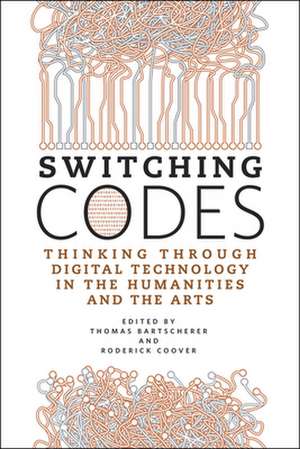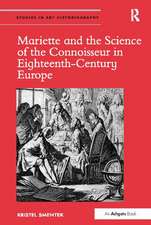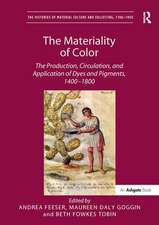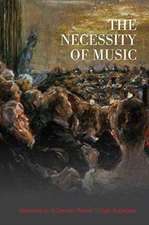Switching Codes: Thinking Through Digital Technology in the Humanities and the Arts
Editat de Thomas Bartscherer, Roderick Cooveren Limba Engleză Paperback – 30 mai 2011
Responding to this challenge, Switching Codes brings together leading American and European scholars, scientists, and artists—including Charles Bernstein, Ian Foster, Bruno Latour, Alan Liu, and Richard Powers—to consider how the precipitous growth of digital information and its associated technologies are transforming the ways we think and act. Employing a wide range of forms, including essay, dialogue, short fiction, and game design, this book aims to model and foster discussion between IT specialists, who typically have scant training in the humanities or traditional arts, and scholars and artists, who often understand little about the technologies that are so radically transforming their fields. Switching Codes will be an indispensable volume for anyone seeking to understand the impact of digital technology on contemporary culture, including scientists, educators, policymakers, and artists, alike.
| Toate formatele și edițiile | Preț | Express |
|---|---|---|
| Paperback (1) | 325.59 lei 6-8 săpt. | |
| University of Chicago Press – 30 mai 2011 | 325.59 lei 6-8 săpt. | |
| Hardback (1) | 672.90 lei 6-8 săpt. | |
| University of Chicago Press – 30 mai 2011 | 672.90 lei 6-8 săpt. |
Preț: 325.59 lei
Nou
Puncte Express: 488
Preț estimativ în valută:
62.31€ • 64.81$ • 51.44£
62.31€ • 64.81$ • 51.44£
Carte tipărită la comandă
Livrare economică 12-26 aprilie
Preluare comenzi: 021 569.72.76
Specificații
ISBN-13: 9780226038315
ISBN-10: 0226038319
Pagini: 448
Ilustrații: 40 halftones, 4 line drawings
Dimensiuni: 152 x 229 x 30 mm
Greutate: 0.59 kg
Editura: University of Chicago Press
Colecția University of Chicago Press
ISBN-10: 0226038319
Pagini: 448
Ilustrații: 40 halftones, 4 line drawings
Dimensiuni: 152 x 229 x 30 mm
Greutate: 0.59 kg
Editura: University of Chicago Press
Colecția University of Chicago Press
Cuprins
Introduction
Thomas Bartscherer and Roderick Coover
Thomas Bartscherer and Roderick Coover
I. Research, Sense, Structure
How Computation Changes Research
Ian Foster
Ian Foster
We Digital Sensemakers
Mark Stefik
Mark Stefik
Scholarsource: A Digital Infrastructure for the Humanities
Paolo D’Iorio and Michele Barbera
Paolo D’Iorio and Michele Barbera
Responses
“We Will Really Know”
Alan Liu
Alan Liu
On Scholarship
Graham White
II. Ontology, Semantic Web, Creativity
Switching Partners: Dancing with the Ontological Engineers
Werner Ceusters and Barry Smith
Werner Ceusters and Barry Smith
The Semantic Web from the Bottom Up
James Hendler
Logical Induction, Machine Learning, and Human Creativity
Jean-Gabriel Ganascia
Jean-Gabriel Ganascia
Responses
Relating Modes of Thought
William J. Clancey
William J. Clancey
Intelligence and the Limits of Codes
Albert Borgmann
Albert Borgmann
Interlude
Figment: The Switching Codes Game
Eric Zimmerman
Eric Zimmerman
III. Panorama, Interactivity, Embodiment
The Digital Panorama and Cinemascapes
Roderick Coover
Roderick Coover
Re-place: The Embodiment of Virtual Space
Jeffrey Shaw, Sarah Kenderdine, and Roderick Coover
Jeffrey Shaw, Sarah Kenderdine, and Roderick Coover
Response
Rewiring Culture, the Brain, and Digital Media
Vibeke Sorensen
Vibeke Sorensen
IV. Re/presentations: Language and Facsimile
Electronic Linguistics
George Quasha in dialogue with Gary Hill
The Migration of the Aura, or How to Explore the Original through Its Facsimiles
Bruno Latour and Adam Lowe
Responses
The Truth in Versions
Charles Bernstein
Charles Bernstein
Pamphlets, Paintings, and Programs: Faithful Reproduction and Untidy Generativity in the Physical and Digital Domains
Judith Donath
Judith Donath
Epilogue
Enquire Within upon Everything
Richard Powers
Richard Powers
List of Contributors
Index
Notă biografică
Thomas Bartscherer is assistant professor of humanities and director of the Language and Thinking Program at Bard College. He is coeditor of Erotikon: Essays on Eros Ancient and Modern, also published by the University of Chicago Press. Roderick Coover is associate professor in the Department of Film and Media Arts at Temple University. He is the author of the digital publications Cultures In Webs: Working in Hypermedia with the Documentary Image and Vérité to Virtual: Conversations on the Frontier of Film and Anthropology.
Recenzii
“Switching Codes is a highly interesting and important collection of essays that addresses a current, burgeoning concern with the present condition and future of what we now call Digital Humanities. Most remarkably, this book makes a conscious effort to open questions about the future of scholarship in digitally mediated culture to art that is born digital. This is a book I will refer to frequently.”
“[This book] covers enough ground via specific examples to demonstrate the complex challenges and changes that the digital humanities currently offers to traditional ways of perceiving, thinking, and doing.”
“At a moment when culture's digital makeover seems to have induced epistemological vertigo in many, Switching Codes offers a timely and well-targeted intervention. This book practices what it preaches, provoking cross-disciplinary dialogue and challenging the staid form of the usual essay collection, offering instead an engaging set of critical texts, poetry, fiction, games, and responses. Bartscherer, Coover, and their authors take up the challenges posed by the digital arts and humanities, mapping their new contexts, defining their analytic repertoire, and compelling a fresh set of insights. More than a portrait of our times, Switching Codes exemplifies the very logics that it explicates.”
“What happens when academics invite artists, scholars and technology specialists to discuss the potential and limitations of digital technologies for research and practice in the humanities and the arts? This is the question addressed by Thomas Bartscherer and Roderick Coover’s Switching Codes. . . . What is original in Switching Codes is the performance of this dialogue, which blends essays, interviews, fictional pieces and a game. The result is a multimodal discourse that evokes the experience of navigating online data.”
“Switching Codes . . . offers curious minds an intriguing set of entry points into probing the sensibilities behind this shift, permitting outsiders and insiders alike to assess what happens when knowledge creation occurs through interdisciplinary encounters among artists, humanists, and IT specialists. . . . The project essays and the critiques are each carefully wrought and thoughtfully considered, and they provide ample material for theoretical and methodological reflection, repaying close analysis and re-reading. . . . Each of these interleavings is worth opening up the book—perhaps indicating the benefits of experimenting even further with tried-and-true academic genres in an age of information innovation.”
“Unique and valuable. . . . The editors of Switching Codes illustrate through dialogues that perpetuating a dichotomy between science and the arts is not just false but reductive and beside the point.”















